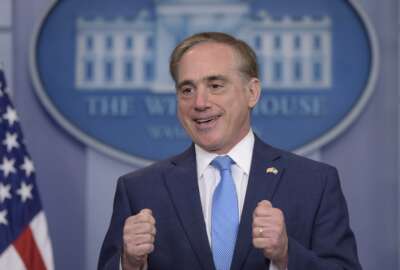
Deadline set for Navy’s move to Windows 10
In today's Federal Newscast, the Navy will need several more months to finish its migration to Windows 10.
To listen to the Federal Newscast on your phone or mobile device, subscribe on PodcastOne or iTunes.
- The Navy will need several more months to finish its migration to Windows 10. In a message to the fleet, the Navy’s top IT official said the service is aiming to finish its move to the new operating system by June of this year and that users need to start getting ready. The Air Force made a similar announcement last week, saying all of its computers would need to migrate to Windows 10 by the end of March or risk being cut off from the network. In both cases, the military services are long past an original deadline the deputy secretary of Defense set two years ago, ordering the entire department to make the move by January 2017. (Navy)
- More career senior executives earned performance bonuses in fiscal 2016, compared to the previous year. 81 percent of career executives earned a performance award in 2016. Up 10 percent from the previous year. Awards themselves were also higher than in the past. Average bonuses topped out at close to $12,000. That’s nearly $3,700 more than the average SES award in 2015. Those awards made up about 6.4 percent of executives’ aggregate salaries in 2016. (Federal News Radio)
- The Census Bureau is nearly three months late in responding to lawmakers’ questions about the 2020 count. Members of the House Oversight and Government Reform Committee told the acting Census director they’re less than confident about a full-scale field test scheduled to take place in April. Committee members expect a response from Census before March 8 when Commerce Secretary Wilbur Ross plans to testify before the committee about the Census field test. (House Oversight and Government Affairs Committee)
- HHS plans to create a new platform to manage its small business contracting efforts. For maybe the first time ever, the Department of Health and Human Services will fall short of its small business contracting goal. Michelle Street, the deputy director for operations in the HHS Office of Small and Disadvantaged Business Utilization, said while 2017 data isn’t quite final, the agency will miss its goal of awarding 22.47 percent of its contracts to small firms. But Street said a new small business customer experience platform will launch later this year and it will help turn the tide in 2018. The SBCX will bring together three disparate tools to give contracting officers and small businesses better information.
- New guidelines for how publicly traded companies should prepare disclosures about cybersecurity risks and incidents were approved by the Securities and Exchange Commission. SEC Chairman Jay Clayton said the new rules will promote clearer and more robust disclosures by companies about their cyber challenges. (Securities and Exchange Commission)
- The Indian Health Service, leaderless since 2015, will stay that way for a while. Robert Weaver, the White House nominee for the job, has withdrawn his name. The Wall Street Journal reported, Weaver had exaggerated his work experience. He reportedly had filed for personal bankruptcy and failed to pay federal taxes for a business he owned. He is a member of the Quapaw tribe of Oklahoma. The Indian Health Service is part of the Health and Human Services Department.
- The Veterans Affairs Department announced a medical research partnership to study patient deterioration during hospital stays. VA will partner with DeepMind to analyze patterns in 700,000 de-personalized electronic health records. Both organizations will look for patterns to develop machine learning algorithms to identify risks and predict onset for patient deterioration. DeepMind is a company that specializes in artificial intelligence research. (Department of Veteran Affairs)
- A key Veterans Affairs nomination from President Trump. He named Paul Lawrence as his pick for Under Secretary of Veterans Affairs for Benefits. Lawrence currently serves as vice president at Kaiser Associates. Before that he was a partner in the Federal Government practices at two of the Big Four accounting firms. He’s also authored and co-authored several books on Federal Government Management. (White House)
- Congress is considering closing the benefits gap between deployed reservists and guardsmen and active duty military. A new bill from Senators Chris Coons (D-Del.) and Roger Wicker (R-Miss.) would provide reservists and guardsmen with a monthly allowance for every month they’re deployed. It would also reduce their required age for retirement benefits. (Sen. Roger Wicker)
Copyright © 2024 Federal News Network. All rights reserved. This website is not intended for users located within the European Economic Area.
Eric White
Eric White is news anchor and Federal Drive producer at Federal News Network.
Follow @FEDERALNEWSCAST
Related Stories
Related Topics
Agency Oversight
All News
Budget
Census Bureau
Chris Coons
Congress
DeepMind
Defense
Defense
Defense News
Department of Health and Human Services
Department of Veterans Affairs
Federal Drive
Federal Newscast
IHS
Indian Health Service
IT Modernization
Jay Clayton
Management
Quapaw
Robert Weaver
Roger Wicker
SEC
SES
Technology
Trump administration
Veterans Affairs
Windows 10





